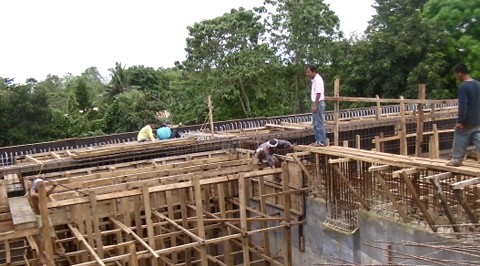
When Eduardo and Belen Armington moved to the town of Silang 30 years ago, they recall having to walk more than one hour to the river to wash their clothes and fetch water. The trip back to town was even worse with wet clothing and jugs of water in tow. Conditions improved when a community-based water tap was installed in 1984, but its limited hours meant residents had to line up as early as four in the morning to collect water for morning activities. Water financing was secured in 2009 through the Philippine National Bank as a result of a USAID co-guarantee with a private Philippine guarantor, the LGU Guarantee Corporation. Today, the Armingtons enjoy access to clean water 20 hours a day from the convenience of their home.
Limited water financing is one of the primary obstacles to improving access to clean water for millions of people throughout the world. Finding diverse and sustainable water financing is never a luxury and always a necessity. People who lack direct access to water in their homes typically pay a much higher rate for water than those who are connected to a piped water system. Apart from the financial cost to these families, there are also economic costs due to productivity lost from time spent collecting water, or health costs from illnesses or deaths brought about by drinking unsafe water. In the Philippines alone, 11,338 residents die prematurely each year from water-borne diseases.
Financing from private banks in the water sector, except for the two Metro Manila concessionaires, was practically nonexistent in the Philippines, as many water utilities relied solely on public resources. This type of financing was inadequate considering the government could provide only 50% of the required investment to meet its country's water supply targets. USAID realized the missing link was leveraged funding from the private sector.
To encourage private investors to enter the water sector, USAID utilized its Development Credit Authority (DCA), a mechanism that allows risk sharing through partial loan and bond guarantees. The model worked: The Philippines Water Revolving Fund (PWRF), launched in 2008 with the support of USAID, Japan International Cooperation Agency, the Development Bank of the Philippines, and other contributing partners, successfully attracted private financing for water and sanitation projects. The new public-private financing model forever altered the dynamics of water financing in the Philippines.
In 2010, a DCA-backed, $2.6 million private loan leveraged $10 million in public financing under the PWRF for water rehabilitation in the Puerto Princesa City Water District. This rehabilitation will mean improved water delivery for 117,000 people in 36 villages and the development of new water sources that would grant additional access to 48,000 people by 2014. USAID's PWRF Program Manager, Joy Jochico, said, "This marks the beginning of more water projects in the Philippines being co-funded by the government and private banks. This financing structure allows the public-private partnership funds to stretch in order to provide safe and accessible water for more Filipinos."
To date, USAID has used the DCA to co-guarantee ten loans for water districts in the Philippines totaling over $42 million of private sector funding. These projects have benefited close to one million Filipinos. Eduardo, one of those individuals, described the impact, "When we first arrived here in the resettlement area, life was extremely difficult and we had to make great sacrifices to fetch water every day. Today our lives have really improved because the water lines are now extended inside our homes."
Beneficiaries of USAID water guarantees are not limited to the Philippines. Globally, USAID has used DCA to make available $177 million in private financing for water and sanitation services in India, Egypt, Bulgaria, Serbia, Albania, Honduras, and Kenya. USAID is optimistic about working with other municipalities and private financial institutions to improve access to water and sanitation services through partial credit guarantees.
S. Grosser, S. Gudnitz







Comment
Make a general inquiry or suggest an improvement.